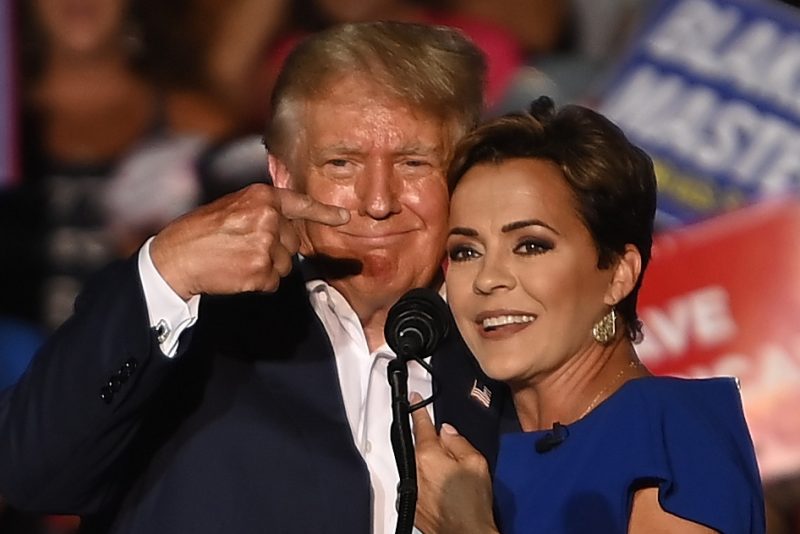The worst Donald Trump has fared in polling for the Republican 2024 presidential nomination came soon after he announced his candidacy.
You’ll recall that the timing was odd: Trump jumped into the race only days after the 2022 midterms, an election cycle in which Republicans underperformed both expectations and historical trends — with Trump receiving no small amount of blame for that underperformance. He endorsed candidates in Arizona and Pennsylvania (among other places) who won the Republican nomination only to lose close races to Democrats.
In the eight-year-long hunt for an argument that would inspire Republicans to shift their allegiances away from Trump, this seemed like a promising one: Trump would doom the party to losing. In a handful of polls taken in the weeks after the midterms, Florida Gov. Ron DeSantis came out on top. By the beginning of January, Trump led DeSantis by only a handful of points in FiveThirtyEight’s average of GOP primary polls.
It didn’t last, as you know. Trump started to pull away from DeSantis, movement that accelerated quickly once he was indicted in New York. That tiny gap in Trump’s armor appears to have sealed shut.
The critique nonetheless remains true, as new research from Michael Heseltine of the University of Amsterdam demonstrates. Having Trump’s support is a huge asset to Republicans seeking their party’s nomination. He is also a drag on their general-election chances.
In 2020, Heseltine was part of a team that assessed Trump’s 2018 endorsement record. They found that his endorsement probably cost Republicans 11 seats in the House — largely a function of Trump’s endorsement serving as a boon for the Republicans’ Democratic foes. Yes, Trump’s endorsement sent a key signal to his supporters. But it also sent a loud signal to his opponents.
Heseltine was curious how Trump’s endorsements fared in the two subsequent federal elections, including those 2022 midterms where Trump was simply the former president of the United States.
“Endorsed candidates received a consistent and substantial electoral benefit in Republican primary elections,” Heseltine found, “with these benefits growing marginally over time. Trump’s endorsements came increasingly early in the election cycle, with an increased focus on backing likely winners and rewarding political allies during the primaries.”
His analysis estimates that Trump added about 14 points to a primary candidate’s vote share in the Republican primary election over the three cycles from 2018 to 2022. In 2018, the effect was estimated at about 10 points.
Then those primary candidates faced off against Democrats.
“Across all election cycles, his endorsements produced little benefit for candidates in the general election,” Heseltine writes. “Endorsed candidates did not benefit financially and collectively received an aggregate vote share penalty of approximately 1.5 percentage points.”
You can see that below. The dots indicate the estimated effect on vote share in each election and overall. The lines indicate uncertainty in the data.
Granted, the negative effect was small. But it was not zero.
This pattern still looms over Trump. He has endorsed a candidate in the 2024 Republican presidential primary: Donald Trump. That has helped power him to a big advantage over DeSantis and the other candidates. But Democrats are hopeful that should he win the nomination, he will serve as a strong incentive for voters lukewarm about President Biden to come out and vote against Trump. In other words, they’re hoping that the negative effect works on Trump himself, too.
It’s unlikely that Trump’s Republican opponents for the nomination will be able to do much with Heseltine’s research. After all, they are forced into a position of arguing that the guy currently beating them by something like 30 points (at a minimum) is an electoral loser. They can point to the results for his endorsed candidates in 2022, yes, but he can argue that wasn’t him. They’ll have a tougher time pointing to his own popular-vote loss in 2016 (since he still became president) or his loss in 2020 (which most Republicans still chalk up to the system working against him).
How do you convince people that a guy who keeps leading in polling, and who has convinced primary voters that he has won two presidential races in a row, is a drag on the GOP ticket? The short answer, so far, is that you don’t.



























